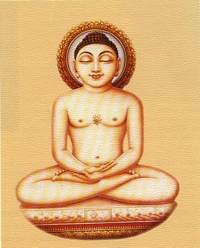
JVB London - Souvenir 2007
on
Ahimsa
Non-violence
Ahimsa: Some Reflections
Non-violence is accepted as the central tenet of Jainism - our ultimate aim is to be kind in thought, speech and action to every living being. This can be seen from the strictness of a pure Jain diet to the way monks and nuns sweep the floor before walking to protect any insects. Whist in our daily lives, intentional physical violence is limited, real effort is required in not saying negative things about others. Even more difficult than suppressing destructive speech is the challenge of not allowing violent thoughts to arise in our minds.
A recent article in a newspaper gave me food for thought. The article described a television actor's experience on the train. He had witnessed an aggressive man violently beating up an innocent fellow traveller. Though the fellow commuters had seen the lead-up to the incident and knew the victim was not guilty, nobody stepped in to stop the violence. The actor had two options - use violence to try to stop the attacker or be non-violent himself and be a silent witness to the act of violence taking place. The actor chose the latter out of fear and was left with feelings of guilt after the event.
Though Jainism is quite clear on the importance of non-violence, Jains agree that violence in self-defense can be justified. It can be argued that remaining silent out of fear is not an example of pacifism but passivity. Real pacifism would seem to come from keeping the peace even if violence eventually must be used to maintain or create peace.
The actor's response in this situation is realistic and cannot be judged - but his experience makes me re-evaluate whether all our acts of non-violence are inspired by the right reasons. Ideally, being non-violent should be a positive conscious choice rather than a by-product of the withdrawal from all action.
Jainism might urge self-restraint but it does not urge passivity. Though the objective of Jains is to destroy all their karma - positive and negative - and acquire no more, this cannot be done by a complete withdrawal from life; instead, it can be achieved by living with a state of equanimity. This is a rather difficult concept to grasp and gets confused with a need for isolation.
Although you continue living in the material world and have family, friends and possessions around you, it must be done without a high degree of intensity and emotional attachment that attracts strong karma. One should make a conscious choice to live according to Jain values and take responsibility for all that occurs around them.
 Pooja Jain
Pooja Jain